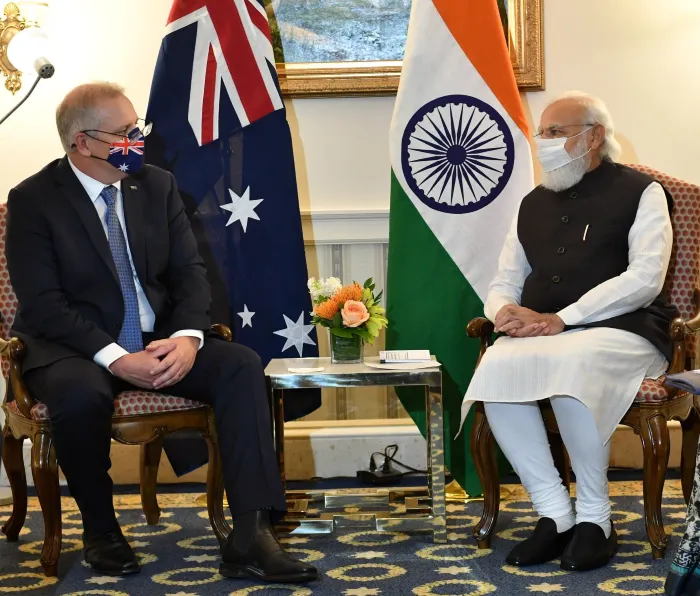A day before he joined US President Joe Biden and UK Prime Minister Boris Johnson in announcing the creation of historic trilateral security partnership AUKUS on September 15, Australian PM Scott Morrison rang up Indian PM Narendra Modi and Japan's Yoshihide Suga informing his Quad partners about the deal.
"I had the opportunity to speak to both Prime Minister Modi and Prime Minister Suga before we made the announcement about the AUKUS arrangement and where we were proceeding with nuclear submarines, that was on the eve, in the afternoon before I did that, as Quad partners and our special relationship with both of those countries," Morrison revealed after the meeting of the Quad leaders at the White House on Friday night.
The news about the new defence pact, said the Australian PM, was "warmly received" by both the leaders and was "subject of the bilateral discussions" he had with both PM Modi and Suga in Washington on Thursday and Friday.
"It's even more warmly received now. They understand what this partnership means for the Indo-Pacific and also the way it's going to better enable ourselves, the United States and the United Kingdom, connect more with them and the work that they're doing," said Morrison.

The first major initiative of AUKUS is to deliver a nuclear-powered submarine fleet for the Royal Australian Navy. After the AUKUS announcement, Australia's Defence Minister Peter Dutton had said that there was a "clear advice" from country's chief of navy and the chief of the defence force that the conventional diesel submarine was not going to provide the capability into the 2030s, 2040s, and beyond, and that they needed a nuclear-powered submarine.
Calling Prime Minister Modi "a dear friend and great friend of Australia", the Australian PM indicated that the defence partnership between both the countries could witness several new initiatives as New Delhi has shown curiosity in the nuclear-powered fleet of submarines.
"Keen interest in that from our partners in India, and well received. And looking forward to see how that continues to progress," Morrison revealed a day after the India-Australia bilateral talks.
Australia said that it sees the Quad and the trilateral partnership of AUKUS as being "completely complementary" which was also discussed extensively in the Modi-Morrison meeting.
"The Quad partners understand the need for positive contributions to regional stability and the AUKUS partnership is all about making that sort of contribution. Everybody gains from a stable Indo-Pacific, everybody gains, including whether it's in China, Japan, Australia, Indonesia, Malaysia, we all benefit from a stable Indo-Pacific," he said.

New Delhi has shown curiosity in the nuclear-powered fleet of submarines (Image courtesy: Twitter/@CN_Australia)
That the AUKUS and the Quad support each other and are mutually reinforcing was also conveyed by Biden, last week.
"AUKUS will also enhance our contribution to our growing network of partnerships in the Indo-Pacific region: ANZUS; our ASEAN friends; our bilateral strategic partners, the Quad; Five Eyes countries; and, of course, our dear Pacific family," Biden had commented.
Meanwhile, as Morrison had said after the bilateral meeting with PM Modi, India and Australia also continue to go forward with a low emissions technology partnership focusing on hydrogen development, ultra low cost solar programmes to support their energy transition and climate change.
As Minister of Commerce and Industry Piyush Goyal and Australia's Minister for Trade and Investment Dan Tehan meet in New Delhi next week, the Australian PM said that he and PM Modi have both tasked their teams to "be ambitious" and look at trade opportunities, particularly in the area of digital trade arrangements.




















